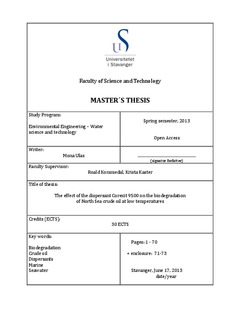| dc.contributor.author | Mona, Ulas | |
| dc.date.accessioned | 2013-09-18T07:29:08Z | |
| dc.date.available | 2013-09-18T07:29:08Z | |
| dc.date.issued | 2013 | |
| dc.identifier.uri | http://hdl.handle.net/11250/182573 | |
| dc.description | Master's thesis in Environmental technology | no_NO |
| dc.description.abstract | Constituents
from
crude
oil
and
petroleum
are
major
sources
of
marine
pollution
and
despite
the
natural
presence
of
crude
oil
hydrocarbons
in
the
marine
environment;
anthropogenic
activity
is
a
major
contribution
to
the
total
release
of
hydrocarbons
to
the
oceans.
The
removal
of
hydrocarbon
pollution
is
based
on
the
natural
weathering
mechanisms,
specifically
biodegradation
and
its
enhancement.
Chemical
dispersants
have
been
developed
that
serve
to
disperse
spilled
oil
more
rapidly
and
extensively
into
the
water
column
as
tiny
oil
droplets,
increasing
the
surface
area
available
for
microbial
biodegradation.
This
study
was
conducted
to
investigate
the
effect
of
temperature
on
biodegradation,
as
well
as
the
effect
of
the
chemical
dispersant
Corexit
9500
on
the
enhanced
biodegradation
of
crude
oil
from
the
Norwegian
oil
field,
Ekofisk.
The
biodegradation
of
the
dispersant
alone
was
also
investigated.
Both
chemical
and
microbiological
methods
were
used
to
analyse
the
effects
on
biodegradation
at
3,
8
and
15°C.
BOD
analysis
showed
increased
biodegradation
rates
with
increasing
temperature.
Total
hydrocarbon
analysis
via
GC-‐FID
revealed
that
between
82
and
95%
of
hydrocarbons
in
the
size
range
between
decane
and
tetracosane
were
degraded
over
a
period
of
46
days.
The
addition
of
Corexit
showed
an
increase
of
hydrocarbon
removal
of
2%
at
8
and
15°C,
and
10%
increased
removal
at
3°C.
Molecular
analysis
revealed
changes
in
the
microbial
community
of
samples
containing
crude
oil.
All
samples,
including
blank
samples
showed
a
shift
in
the
microbial
community
from
the
original
community
found
in
the
source
seawater,
over
the
biodegradation
period
of
46
days.
Based
on
the
results
of
this
study
it
was
concluded
that
the
addition
of
Corexit
9500
had
little
or
insignificant
effects
on
the
rate
of
biodegradation
of
North
Sea
crude
oil
in
seawater
at
all
temperatures.
Increased
biodegradation
rates
were
however
clearly
observed
as
temperature
increased.
Further
research
is
recommended
to
better
understand
the
effects
of
chemical
dispersants
on
biodegradation
in
low
temperature
marine
environments
and
to
develop
more
successful
methods
for
the
remediation
of
hydrocarbon
contamination. | no_NO |
| dc.language.iso | eng | no_NO |
| dc.publisher | University of Stavanger, Norway | no_NO |
| dc.relation.ispartofseries | Masteroppgave/UIS-TN-IMN/2013; | |
| dc.subject | biodegradation | no_NO |
| dc.subject | crude oil | no_NO |
| dc.subject | dispersant | no_NO |
| dc.subject | teknisk miljøvern | no_NO |
| dc.subject | vann | no_NO |
| dc.subject | seawater | no_NO |
| dc.title | The effect of the dispersant Corexit 9500 on the biodegradation of North Sea crude oil at low temperatures | no_NO |
| dc.type | Master thesis | no_NO |
| dc.subject.nsi | VDP::Technology: 500 | no_NO |
